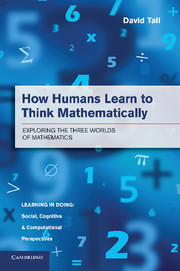Book contents
- Frontmatter
- Dedication
- Contents
- Series Foreword
- Journeys through three worlds of mathematics
- Preface
- Acknowledgements
- Illustration Credits
- I Prelude
- II School Mathematics and Its Consequences
- III Interlude
- IV University Mathematics and Beyond
- 10 The Transition to Formal Knowledge
- 11 Blending Ideas in the Calculus
- 12 Expert Thinking and Structure Theorems
- 13 Contemplating the Infinitely Large and Small
- 14 Expanding the Frontiers through Mathematical Research
- 15 Reflections
- Appendix Where It All Came From
- References
- Index
14 - Expanding the Frontiers through Mathematical Research
from IV - University Mathematics and Beyond
Published online by Cambridge University Press: 05 June 2014
- Frontmatter
- Dedication
- Contents
- Series Foreword
- Journeys through three worlds of mathematics
- Preface
- Acknowledgements
- Illustration Credits
- I Prelude
- II School Mathematics and Its Consequences
- III Interlude
- IV University Mathematics and Beyond
- 10 The Transition to Formal Knowledge
- 11 Blending Ideas in the Calculus
- 12 Expert Thinking and Structure Theorems
- 13 Contemplating the Infinitely Large and Small
- 14 Expanding the Frontiers through Mathematical Research
- 15 Reflections
- Appendix Where It All Came From
- References
- Index
Summary
We often hear that mathematics consists mainly in ‘proving theorems’. Is a writer’s job mainly that of ‘writing sentences’? A mathematician’s work is mostly a tangle of guesswork, analogy, wishful thinking and frustration, and proof, far from being the core of discovery, is more often than not a way of making sure that our minds are not playing tricks.
(Gian-Carlo Rota)Solving Problems and Proving Theorems
We are now moving towards the frontiers of our journeys through three worlds of mathematics, as mathematicians build on their experience to develop new formal knowledge structures. Mathematicians who become successful in research have powerful integrated knowledge structures with crystalline concepts that blend together their previous experiences to produce new theories. Although the theories may be expressed in terms of formal definitions and proofs, their creation, in the words of Gian-Carlo Rota, is ‘a tangle of guesswork, analogy, wishful thinking and frustration’.
As William Byers reveals in How Mathematicians Think, true creativity in mathematical research arises out of paradoxes, ambiguities and conflicts that occur when ideas from different contexts come into contact. It is the drive to solve problems that keeps mathematical research alive.
Information
- Type
- Chapter
- Information
- How Humans Learn to Think MathematicallyExploring the Three Worlds of Mathematics, pp. 386 - 401Publisher: Cambridge University PressPrint publication year: 2013
